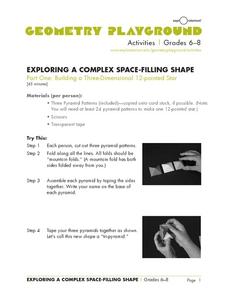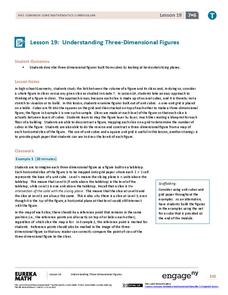Scholastic
Study Jams! Edges, Faces, Vertices
Before determining the classification of a three-dimensional shape, you need to know about the characteristics of a vertex, edge, and face. Go step-by-step using a prism, and discover what each aspect refers to and how it applies to...
Curated OER
Measuring Area: Sensible Flats
Here's how to calculate the areas of polygonal figures. In this measuring area lesson, upper graders use hash marks to create and count square units. They also problem solve a cyberchase activity watching Quicktime videos.
Curated OER
Making Two-Dimensional Shapes
Which shapes fit? Learners practice visual discrimination using a geometry learning exercise, which has them examine shapes that have been divided in half. They observe a set of shapes to determine which of them would fit into each half...
Pennsylvania Department of Education
Shapes Around Us
Learners use manipulatives to study shapes. They sort shapes and use correct geometric terminology to describe them. Students find real-life examples of 2 and 3 dimensional shapes, and classify figures in their classroom according to...
Curated OER
Using the Web to Explore Shapes
Third graders research the Internet to locate geometric designs in familiar buildings. They review shapes, solids, angles and symmetry as they research websites of familiar buildings in Louisville. They record the information they see...
Curated OER
Recognize and Draw Shapes
What type of shape is this? Learners practice identifying shape attributes as they name a parallelogram and an oval and count the sides of a cube and a triangle. There are multiple-choice answers for the shape-name questions, so...
Curated OER
Shape Tool
Learners explore various polygons and examine how shapes can be manipulated in a variety of ways. For this shape tool lesson, students identify geometric shapes in two dimensions. Learners identify and draw one line of symmetry in a...
Curated OER
Guess My Shape
Learners describe shapes to other students who have to guess that shape. In this shape lesson plan, learners describe shape attributes to other students. Then those other learners have to guess the shape that is being described to them....
Curated OER
I Spy Shapes
Learners play a game in which they name geometric shapes. In this geometric shape lesson, students ask "yes and no" questions to determine which shape one of their classmates has chosen. They ask questions that lead them to the name of...
Curated OER
Geometry and Shapes in the X-36
Students describe, draw, and classify shapes. They use the internet to research the X-36 aircraft. Students identify the geometric shapes in the aircraft. They calculate the number of sides in an x-36.
Curated OER
"Polly"gon Pockets
Explore polygons with your elementary learners. Divide the class in 12 to configure the polygon puzzle before them. They list the attributes of each type of polygon they see, and if there's time, they jump on the interactive website...
Alabama Learning Exchange
Polygons-Changing Area Versus Changing Perimeter
Investigate the area and perimeter of polygons in this geometry activity. Young geometers use grid paper to draw a quadrilateral and calculate its area and perimeter. They also read The Greedy Triangle to identify the changing shape of...
Exploratorium
Exploring a Complex Space-Filling Shape
Middle schoolers build a three-dimensional 12-pointed star as a geometric exercise. The shape is quite-difficult to construct. Luckily there is an excellent template that learners cut out, then use to make their pyramid. The second part...
Curated OER
What's in the Bag?
Help your students identify the attributes of two-dimensional shapes. They read the book Round is a Mooncake, and use pattern blocks to sort shapes. Students sort shapes according to their attributes.
Curated OER
Properties of Polygons, Parallel Sides, and Right Angles
Have fun with shapes! Third graders read a set of instructions and circle the shape in the description. They work on recognizing parallel sides and right sides. Use this resource as homework after your geometry lesson.
Curated OER
Poly-Mania
This hands-on lesson takes young geometers on a tour of 2D polygons and 3D polyhedrons. After exploring different web resources and discussing geometric shapes, small groups construct models of polyhedrons using bendable straws. Note:...
Curated OER
Classifying Three-Dimensional Shapes
Compare geometric solids based on their properties. Your emergent geometers use spaghetti and marshmallows to build models so they can examine the number of faces, edges, and vertices on polyhedra of their own creation. Resource includes...
EngageNY
Cones and Spheres
Explore methods for finding the volume of different three-dimensional figures. The 20th lesson in the 25-part series asks learners to interpret diagrams of 3-D figures and use formulas to determine volume. Scholars must use the...
Curated OER
Tiling the Classroom
Learners see how to identify regular polygons, how to slide, turn and flip polygons, and why certain polygons tessellate better than others. Groups create a one foot square design to be used to tile the classroom. Great lesson!
EngageNY
Understanding Three-Dimensional Figures
You can't judge a book by its cover ... or a cube structure by just one face. A creative instructional activity looks at the shape of several cube structures described by level slices. The 20th instructional activity of the 29-part...
Noyce Foundation
The Shape of Things
Investigate the attributes of polygons. A thorough set of lessons presents problem scenarios for elementary through high school classes. The first lessons focus on basic characteristics of polygons, including the line of symmetry. As the...
Curated OER
Transformations - Rotations in the Coordinate Plane
In this geometry lesson, math scholars brainstorm examples of rotations. Using the SMARTboard, students observe a rotation. They create their own rotation using graph paper. Finally, pupils complete a worksheet and graph rotations.
Mathematics Assessment Project
Designing a 3d Product in 2d: a Sports Bag
Sew up pupil interest with an engaging, hands-on lesson. Learners first design a sports bag given constraints on the dimensions of fabric. They then evaluate provided sample responses to identify strengths and weaknesses of included...
Curated OER
Does Your Field Measure Up
Students measure angles using a plane table kit. In this geometry lesson, students use trigonometric identities to find the values of the length of a football field.






















